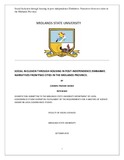Please use this identifier to cite or link to this item:
https://cris.library.msu.ac.zw//handle/11408/3760Full metadata record
| DC Field | Value | Language |
|---|---|---|
| dc.contributor.author | Shoko, Cosmas Tinashe | - |
| dc.date.accessioned | 2020-03-09T09:55:47Z | - |
| dc.date.available | 2020-03-09T09:55:47Z | - |
| dc.date.issued | 2019 | - |
| dc.identifier.uri | http://hdl.handle.net/11408/3760 | - |
| dc.description.abstract | This narrative study on social inclusion through housing in Gweru and Kwekwe cities sought to decipher the exclusivity or inclusivity of housing processes or practices. In theory Zimbabwe post-independence housing policy has given attention to inclusivity of all citizens’ (housing for all) whereas in practice the exclusion of citizens in the provision and delivery of housing is quiet prevalent. The housing processes, practices, models and schemes excludes vulnerable groups such as low income groups, the unemployed, dependents, lodgers, homeless people and disabled groups among others. Deliberate housing schemes and programs aimed at social inclusion have been over and again implemented in the city of Gweru and city of Kwekwe but social exclusion remains alive. The numbers of people on the council’s waiting list are higher than the beneficiaries that benefit whenever stands are sold by councils. Even housing schemes such as co-operatives, low-cost housing schemes and start paying for your house schemes are not always inclusive. The research identified the causes of exclusive housing at Gweru and Kwekwe cities. It also assessed the inclusivity or exclusivity of the stand allocation process at Gweru and Kwekwe cities. Gweru city and Kwekwe city adoption of inclusive housing was examined. The study assessed housing schemes and models available in Gweru and Kwekwe cities. Interviews and secondary data were used as research instruments for data collection. The researcher collected data from a sample of 37 participants that consisted of households, council officials, bank officials and property developer officials. Narratives from the respondents revealed that, the causes of exclusive housing in both cities were poverty, unaffordable housing, servicing of land is costly, culture, family dependence, urbanization, migration and housing demand. Fewer narrators were satisfied with the inclusivity of stand allocation processes and many cited nepotism, corruption and housing unaffordability as the major drawbacks to social inclusion. Stories of adoption of inclusive housing revealed loss of hope, uncertainty. Economic shocks, poverty and the lack of political were concluded as some of the setbacks to the adoption of inclusive housing. In as much as the research revealed that, both cities had made some strides in adopting and implementing a number of different housing schemes the narrators expressed hopelessness towards provision of social housing and homeownership. The researcher concluded that, social inclusion through housing in both cities was still a long way to go and a missing link. | en_US |
| dc.language.iso | en | en_US |
| dc.publisher | Midlands State University | en_US |
| dc.subject | Social inclusion | en_US |
| dc.subject | Social exclusion | en_US |
| dc.subject | Housing | en_US |
| dc.subject | Narratives | en_US |
| dc.title | Social inclusion through housing in post-independence Zimbabwe: narratives from two cities in the Midlands Province. | en_US |
| item.fulltext | With Fulltext | - |
| item.grantfulltext | open | - |
| item.languageiso639-1 | en | - |
| Appears in Collections: | Master Of Science In Local Governance Studies | |
Files in This Item:
| File | Description | Size | Format | |
|---|---|---|---|---|
| SHOKO C. T SI Thesis Submitted draft 2019.pdf | Full Text | 1.42 MB | Adobe PDF |  View/Open |
Page view(s)
160
checked on Apr 4, 2025
Download(s)
230
checked on Apr 4, 2025
Google ScholarTM
Check
Items in MSUIR are protected by copyright, with all rights reserved, unless otherwise indicated.



